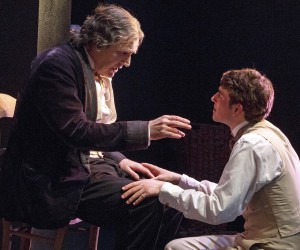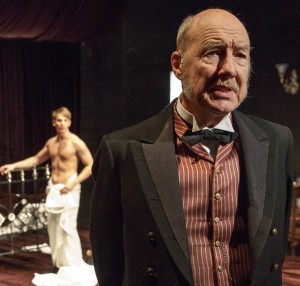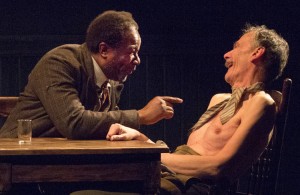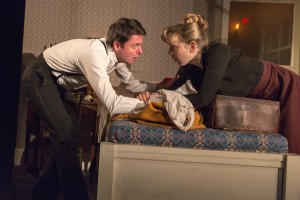Tennessee Williams’s A Streetcar Named Desire has one of drama’s greatest female roles—Blanche DuBois, perhaps only rivaled by Shaw’s St. Joan and Ibsen’s Hedda Gabler. It’s a theatrical mountain that any serious actress would like to scale, and Patsy Ferran deserves credit for doing so, even if the Almeida Theatre production visiting BAM from London comes up short. Directed by Rebecca Frecknall, this Streetcar also features the better-known Paul Mescal (of Gladiator II renown) as Stanley Kowalski.
Our Class
On July 10, 1941, as many as 1,600 Jewish men, women, and children were rounded up and packed into a barn in Jedwabne, a small town in northwest Poland. The locked barn was set ablaze, and everyone inside perished. The pogrom is notable (and controversial) because, unlike similar atrocities in Nazi-occupied cities and villages, the massacre was not carried out solely by officers of the Third Reich or by Soviet nationals. The perpetrators were friends, associates, and neighbors of the Jews with whom they had lived peaceably and side-by-side before the occupation. Although not explicitly about Jedwabne, Tadeusz Słobodzianek’s Our Class follows the basic outlines of the historical events, and under Igor Golyak’s resourceful and potent direction, the play shows that our most barbarous enemies may indeed dwell among us.
Food
Geoff Sobelle’s Food at BAM Fisher is performance art of the most engaging kind. It provokes rumination about man’s relationship to nature, to the use of the environment, and to the distance between tilling the earth with dirty hands and the meal that arrives on a plate at home or in a restaurant. If that implies an overly serious purpose, it is brightened by Sobelle’s interactivity with his audience, his deft sleight of hand, and slapstick that veers into carnival sideshow.
The Wife of Willesden
The Wife of Willesden, novelist Zadie Smith’s captivating playwriting debut, is a contemporary version of The Wife of Bath’s prologue and tale from Chaucer’s Canterbury Tales. As many an English major will attest, Alyson, the Wife of Bath, is the most colorful of the pilgrims whose verse monologues form the bulk of Chaucer’s 14th-century masterpiece. Using rhymed couplets with 10 syllables per line (as did Chaucer), Smith has transformed Alyson to Alvita, a Jamaica-born Londoner of today, in a comedy faithful to its source material yet discerning about contemporary social issues.
Medea
The script for Simon Stone’s Medea at the Brooklyn Academy of Music (BAM) carries the notation “after Euripides.” Anyone who attends and expects tunics and armbands will therefore be disappointed: Stone has modernized the story of the spurned wife of Jason, the Argonaut who turned to the daughter of Creon for physical comfort. His version changes the names of the characters: Medea is Anna; Jason is Lucas; Creon is Christopher; and Creon’s daughter, who doesn’t appear in Euripides, is named Clara and is very much present.
Long Day’s Journey Into Night
It’s a truism that Eugene O’Neill’s Long Day’s Journey Into Night is long and repetitious, so it comes as a surprise that Richard Eyre’s production plays so grippingly that it's never a slog. Eyre makes it clear that the Tyrones, the family at its center (based O’Neill’s own), are deeply dysfunctional, but each repetition at the BAM Harvey Theater rings true, and many of them prove comical. Each character knows the others’ strengths and frailties. Yet although they claw at one another often, there’s pulsing love in this family.
King Lear
In 1940 British critic James Agate said of John Gielgud’s King Lear: “I do not feel that this Lear’s rages go beyond extreme petulance—they do not frighten me!” No such reservation afflicts Gregory Doran’s intelligent and well-spoken Royal Shakespeare Company production, which stars Antony Sher as the king—the Shakespearean role that Sher, who last year played Falstaff at BAM, says will be his last.
An Ideal Betrayal
As Oscar Wilde in David Hare’s 2012 revision of his play The Judas Kiss, Rupert Everett has found the role of his career. Though he’ll always be more famous for films such as My Best Friend’s Wedding, his terrific performance in the production visiting BAM helps resurrect a play by the prolific author of Plenty and Skylight that had less impact in its Broadway debut in 1998.
Neil Armfield's staging has given Hare’s play the heft of real tragedy. The Judas Kiss is set at two pivotal points in Wilde’s life: the first act takes place the day he is arrested at the Cadogan Hotel for gross indecency, following the collapse of his 1895 libel case against the Marquess of Queensberry, father of Wilde’s younger lover, Lord Alfred Douglas, aka Bosie. The second takes place two years later, after Wilde has left prison and has settled with Bosie in Naples, living hand-to-mouth.
In both halves Wilde is seen to undermine his own best interests, all for the love of Bosie, played by Charlie Rowe as an arrogant, narcissistic worm in a light blue suit. (Costume designer Sue Blane clearly knows her stuff; it’s a color long associated with homosexuals.) The first act revolves around Wilde’s refusal to leave England, even as his old friend and ex-lover Robbie Ross (Cal MacAninch) urges him to. Yet Wilde foolishly won’t take the carriage that awaits to spirit him to the Continent.
Instead, Wilde tries his best to be unflappable, tossing off witticisms and demanding a meal of lobster before the police arrive to arrest him. Everett handles the timing and the wit with ease, and he’s physically right as well: tall, and in a fat suit, a bit stout, just like Wilde. He claims to foresee what is going to happen, yet, he says, “I have always had a low opinion of what is called action.” It's a witticism that contradicts his reckless decision to sue Queensberry for libel after being called a “sodomite.” Nonetheless, Everett inhabits the contradictions, the wit, the passion and the foolishness, in a multifaceted, riveting performance.
He’s equally as good in Act II, sitting almost the whole time in a straw hat and lap blanket on a chair in Naples. He and Bosie are in a lowdown hotel, and Bosie is picking up tricks. Tom Colley as an Italian fisherman is one of them; he spends most of his considerable stage time demonstrating that he has no body fat whatsoever. The frank nudity contrasts neatly with the scene that opens the play, when Alister Cameron’s dryly indulgent concierge Moffatt discovers his staffers, Arthur and Phoebe (Elliot Balchin and Jessie Hills), having sex in the darkened room taken by the Wilde entourage. Before Arthur leaves, Moffatt says they must have a talk about the situation later. Twisting a towel around his hand and snapping it ever so slightly, as if it were a riding crop, he warns, “I shall need to reprimand you in person.” His sexual impulses are glimpsed for only a moment, but it’s typical of Armfield’s detail. The contrast between the unruffled acceptance of heterosexuality vs. the disdain for homosexuality, as well as English repression vs. the later Italian vigor, enriches the story.
Hare is one of Britain’s most political playwrights, so barbs aimed at the class system are inevitable. Bosie is an aristocrat who naturally abuses the staff and loudly opposes Robbie’s common sense by insisting his highly placed acquaintances in the House of Lords will pull strings for Wilde. They don’t.
Moreover, Wilde and Bosie are only two sides of a love triangle. MacAninch invests the dapper, punctilious Robbie with an almost palpable unrequited affection for Wilde. His yearning makes their parting the most moving moment in the play. And Wilde behaves cruelly to Robbie, yet Robbie takes it with only the subtlest objection.
Wilde is not, however, so blind that he cannot see Bosie’s callowness. When the arrogant youth declares, “I am already the greatest non-narrative poet in English,” Wilde flashes a scowl that’s priceless. Perhaps it's a bit of a stretch for Hare to cast Wilde as a Christ figure, but it’s not hammered at heavily. The kiss of the title quickly follows, as Bosie has been bought out by an allowance from his parents and has packed his bags. The last glimpse of Everett’s Wilde, throwing his head back and laughing uncontrollably, hints at a classic architecture. He has given up everything for a young man who didn’t really love him; and he has sent away the man who did. The first act is tragedy; the second is farce.
David Hare’s The Judas Kiss plays through June 12 at BAM Harvey Theater (30 Lafayette Ave. between Ashland Place and St. Felix St. in Brooklyn). Evening performances are at 7:30 p.m. Tuesday through Saturday; matinees are at 2 p.m. Saturdays and 3 p.m. Sundays. Tickets start at $30. Visit www.bam.org/theater for information.
Delusions Unto Death
After seeing the Goodman Theatre revival of The Iceman Cometh in Brooklyn, it’s tempting to wonder what Eugene O’Neill would have thought of purveyors of the modern 90-minute intermissionless play. Sloth-ridden pikers, perhaps? O’Neill’s late masterpiece runs four hours and 45 minutes at BAM, and it is surely one of the bleakest plays ever written. Don’t let that put you off, however. Robert Falls’s magnificent production may require a marathon sitting, but it’s worth it.
The setting is 1912, in a combination saloon and rooming house filled with those who have hit rock bottom. The proprietor is Stephen Ouimette’s cantankerous Harry Hope (O’Neill’s sense of irony is not subtle), and the denizens are a collection of drunks, waking up gradually in the gloom. At first Natasha Katz’s remarkable lighting barely registers; then it slowly reveals the tables of inebriates.
The group is awaiting Theodore “Hickey” Hickman (Nathan Lane), whose annual arrival for Harry’s birthday party is imminent. Among those on hand are ex-anarchist Larry Slade (Brian Dennehy); Hugo, a Russian-accented anarchist (Lee Wilkof); Ed Mosher (Larry Heumann Jr.), who is Harry’s brother-in-law and worked for the circus; and Joe Mott (John Douglas Thompson), an ex-gambler on the skids who cleans the bar. Other characters include two Boer War veterans from opposing sides and a correspondent in that war; two bartenders; and a trio of self-styled “tarts.”
During the next 48 hours the last vestiges of hope for any of them are stripped away. Before Hickey’s arrival the burnt-out Larry is approached by Don Parritt (Patrick Andrews), a young man whose mother is a firebrand anarchist more devoted to the movement than to him; Don has always looked up to Larry as a father, but now Larry wants Don to take a powder. Someone has sold out the movement, and Don’s mother has been arrested.
When Hickey shows up, he delivers a shock to the group. He’s no longer a drinker. He has faced himself and he has become an evangelist for truth-telling. The Hickey part doesn’t seem tailored to Nathan Lane’s acknowledged comic brilliance, but Lane not only finds comedy where it isn’t apparent, he proves himself a powerful dramatic actor (to be fair, he has done dramatic parts before, but nothing compared to this). The evangelist’s fire and the do-gooder’s brass, the glad-hander’s cheer and optimism—Lane has them all. He jokes around as a salesman must, and yet he also excoriates the others’ “pipe dreams.” You’ll be sick of that phrase by the end of the evening, with “take a hop off the fire escape” a close second—O’Neill overwrites, but he also supplies plenty of humor, and even the repetition, while trying one’s patience, gathers a cumulative, relentless force.
Nora Today
When staging plays from the theatrical canon, contemporary directors are confronted with the question: why should audiences care now? While Henrik Ibsen’s A Doll’s House is undeniably a classic, its relevance always demands redefinition. Although Ibsen claimed the play was humanist rather than feminist in its politics, his protagonist Nora has been touted as a theatrical harbinger of feminism; theater critics have long been denoting the parallels between Nora’s struggles as a wife and mother and those of contemporary women. In the Young Vic’s latest production of Simon Stephens's adaptation of the play, however, A Doll’s House takes on a fresh relevance for audiences at the BAM Harvey Theater. Director Carrie Cracknell resists taking any particular stance on capitalism, gender roles, marriage, or other institutions – but instead focuses on hitting and maintaining a shrill note of anxiety produced by such oppressive institutions. In an economical and political climate that seems more precarious than ever, this mood of institutionalized anxiety is certainly something most of us can relate to right now.
In an endeavor to mimic reality, a traditional box set for a 19th Century piece of realism consisted largely of a drawing room (or kitchen, as in August Strindberg’s Miss Julie), with doors leading to other rooms in the house or to the outside. While intricately decorated, this one-room design emphasized the claustrophobia felt by the characters, who are often entrapped within the oppressive structures of society. For the Young Vic's production, Ian MacNeil’s rotating set defies traditional realism’s claustrophobic designs in favor of a cinematic view of Nora and Torvald’s middle class flat. To watch the characters move inside this dizzying and fascinating carousel is a true marvel to behold. It gives the audience an unfolding panoramic view into the daily lives and private moments of the characters, allowing us to see Nora’s face when she drops the façade – a privilege not afforded by box sets.
Though MacNeil’s set offers a cinematic peek into the characters’ personal spaces, the acting is not cinematic at all. While Hattie Morahan’s bravura performance as Nora certainly stood out as breathtakingly original and honest, Cracknell clearly encouraged the entire cast to be unafraid of bold choices. When eliciting money or favors from Torvald (played compellingly by Dominic Rowan), Morahan’s Nora became as cute, shivery, and saucer-eyed as a baby Disney animal. In a room by herself, however, and left alone to her own inner demons, we can watch Morahan melt into an inner world of anxiety and tension that we begin to understand belies her cuteness.
Audiences of A Doll’s House have come to expect the play’s final note: Ibsen’s famous slamming door. As Nora leaves her home, her family, and the only world she’s ever known, we hear her slam the door behind her. In the Young Vic’s production, Nora does slam her door, but it makes more of a clatter or click than a slam. While possibly disappointing for those of us who want a nice loud slam!, the more subtle departing sound of Morahan’s Nora concludes the production on an ambiguous note. A loud door slam might suggest that Nora is liberated and on to bigger and better things, but Cracknell does not give us this satisfaction. Indeed, Nora steps forward with the same anxiety-ridden-confidence that a college graduate steps forward into today’s precarious job market. It is this raw, situational anxiety that makes Cracknell's production a timely rendition for today.
A Doll's House is playing at the BAM Harvey Theatre (651 Fulton St. in Brooklyn) and has been extended to run through March 23. Performances are Sunday at 3 p.m., Tuesday-Friday at 7:30 p.m., and Saturday at 2 p.m. and 7:30 p.m. Tickets start at $25 and can be purchased by calling 718-636-4100 or by visiting bam.org.



















